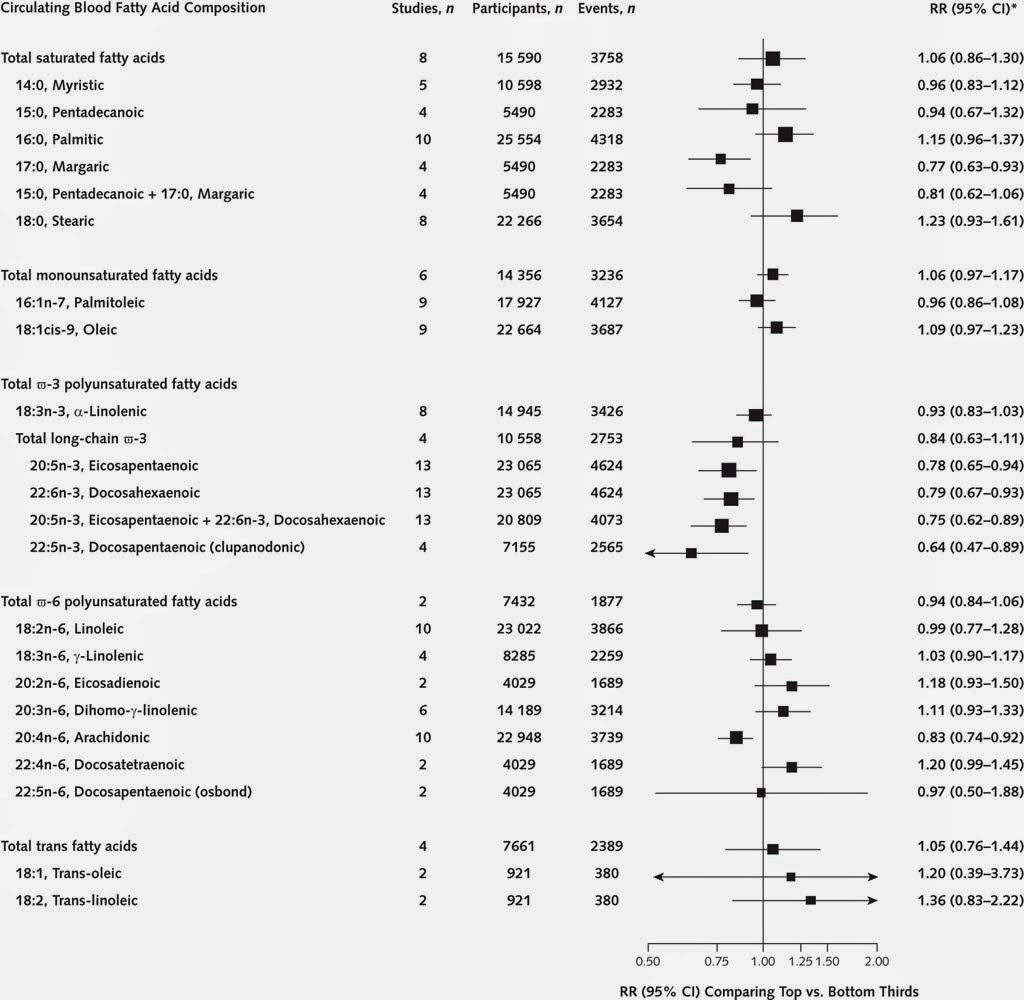 |
| From https://annals.org/data/Journals/AIM/929862/6ff2_Figure_2_RRs_for_coronary_outcomes_in_prospective_cohort_studies_of_circulating_fatty_acid.jpeg |
All saturated fatty acids have a RR for CHD of 1.06 (95% CI 0.86 - 1.30).
∴ There's no association between saturated fat intake and the RR for CHD.
Before LCHF'ers do a dance of joy, consider the Forest plot for individual saturated fatty acids.
Palmitic acid has a RR for CHD of 1.15 (95% CI 0.96 - 1.37).
Stearic acid has a RR for CHD of 1.23 (95% CI 0.93 - 1.61).
Red meat & saturated fats synthesised by DNL aren't looking too good. However...
Pentadecanoic acid has a RR for CHD of 0.94 (95% CI 0.67 - 1.32).
Margaric acid has a RR for CHD of 0.77 (95% CI 0.63 - 0.93).
Pentadecanoic acid and Margaric acid combined have a RR for CHD of 0.81 (95% CI 0.62 - 1.06).
What are Pentadecanoic acid & Margaric acid found in? The clue's in the title:-
Say cheese: saturated fat in dairy may protect against diabetes.
The article in the Telegraph is actually referring to Differences in the prospective association between individual plasma phospholipid saturated fatty acids and incident type 2 diabetes: the EPIC-InterAct case-cohort study.
The above study is about T2DM not CHD, but Dietary intake of saturated fat by food source and incident cardiovascular disease: the Multi-Ethnic Study of Atherosclerosis shows that small amounts (5-10g/day) of dairy SFAs are protective against CHD, possibly due to the Vitamin K2 content.
Of the omega-3 fatty acids...
Eicosapentaenoic acid has a RR for CHD of 0.78 (95% CI 0.65 - 0.94).
Docosahexaenoic acid has a RR for CHD of 0.79 (95% CI 0.67 - 0.93).
Eicosapentaenoic acid and Docosahexaenoic acid combined have a RR for CHD of 0.75 (95% CI 0.62 - 0.89).
Of the omega-6 fatty acids...
Arachidonic acid has a RR for CHD of 0.83 (95% CI 0.74 - 0.92).
Of the trans-fatty acids...
Trans-oleic acid has a RR for CHD of 1.20 (95% CI 0.39 - 3.73).
Trans-linoleic acid has a RR for CHD of 1.36 (95% CI 0.83 - 2.22).
8 comments:
I doomed. Stearic and palmitic acids are the primary components of cocoa butter.
Death by chocolate, huh? The RR isn't that high. I've made a slight mistake in that the study is about CHD, but the Guardian article is about diabetes. I'll sort it out when I get home. Hopefully, nobody will notice!
Too late. ; )
Nah. I'm kiddin'. I did notice, but hey, no 'beetus.
The dose makes the poison?
With chocolate, there is only one dose - the whole lot! ;-)
Looks good.
From the list of studies, Pilz, 2007 (...elevated plasma FFAs are an independent risk factor for future sudden cardiac death in patients referred to coronary angiography.”) & Veech, 2004 (“Current ketogenic diets are all characterized by elevations of free fatty acids”) look like a couple more nails for the Ketogenic Diet coffin.
This is another "data-dilution" job, just like Siri-Tarino et al.
DON'T PANIC!
See http://www.reportingonhealth.org/2014/07/03/how-confuse-media-and-public-butter-them
"One of my favorite fats, stearate, a primary fat in chocolate is
in fact saturated and yet chocolate possesses cardioprotective
properties! The bottom line is that small to moderate amounts of your
favorite fat is less of an issue than overconsumption of any fat, carb
or macronutrient for that matter."
You not doomed. You have to look at the bigger picture. There's good stuff in chocolate. And it tastes like chocolate! :-D Enjoy!
Thank you for writing this post
Post a Comment